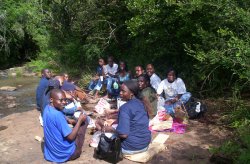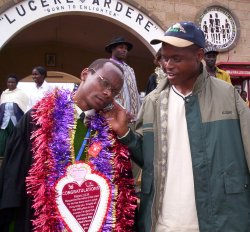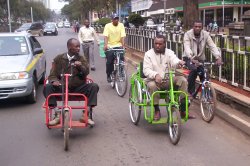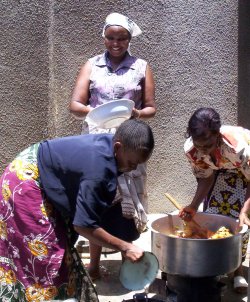 |
|||||
|
|
 |
 |
 |
 |
 |
|
TOURISM
IN KENYA The People of Kenya >  Having a picnic at a nature reserve outside Nairobi.  College graduate talking to relatives on phone.  With increasing traffic congestion, cycling is becoming an attractive option in Kenyan towns.  Women preparing the family meal. In Kenya, traditional gender roles are part of daily living. |
The People of KenyaKenya is a multiracial, multi ethnic nation with citizens of diverse socio-economic, religious and cultural backgrounds co-existing with the collective will of making things better for future generations. The Kenyan tendency of pursuing peaceful politics is responsible for the relative stability that the country has enjoyed in comparison to other neighboring African states. Dialogue and non-violence are virtues taught in schools from an early age and the consequences of violence, as narrated by refugees, are well known to all Kenyans. Since the early days of Independence, Kenyans have built their lives around such goals as acquiring an education, starting a business, getting a job, investing in property or contesting leadership positions through elections. Individuals attempting to incite violence have only excelled in alienating themselves from the public mood. Kenyans have long realized the importance of globalization. The people actively pursue advanced education to the extent of relocating overseas. The spirit of entrepreneurship is well established and the informal sector absorbs approximately 65% of the labor force. Its possible to live and work anywhere in the country regardless of race or ethnicity. These characteristics that have made the population very accommodative, and Kenya is a welcome place for investors from all over the world. Highly skilled Kenyans can be found in the United Nations, the European Union, the World Bank and other international bodies. Kenyan academics serve as departmental heads in renowned academic institutions. Individual Kenyans have played a key role in peace talks across Africa, including the negotiations that ended Apartheid in South Africa. The country's military and police forces have participated in international peace keeping missions in Namibia, Sierra Leone, Eritrea, Bosnia, East Timor, Iraq/Iran, among other hot spots. The skills thus brought back home have developed the countryís social economic fabric to a level relatively higher than what can be found elsewhere in the region. Undoubtedly we still have a long way to go before everyone can enjoy a comfortable standard of life. Kenyan athletes have
continuously broken world records in track events. Occasionally Kenyans
do happen to take all three medals in international athletic meetings.
The prowess of our people in track and field has sparked off scientific
research as to why Kenyans are so endowed on this particular area.
Various theories have been tabled, including the effects of high
altitude at the Kenya highlands and the hilly terrain which helps
develop body muscles at an early age. Unfortunately, Kenya's
performance in the 2004 Summer Olympics was disappointing to many. A
thorough investigation in the country's sports management is necessary
if Kenya is to reclaim its rightful place as a nation of world class
athletes. A typical visitor may be
surprised at the contradiction in professing traditional and modern
beliefs simultaneously. Several commentators have interpreted this
characteristic of Kenyans as a lack of commitment to either beliefs. To
Kenyans, however, the two beliefs contain elements that compliment
each other. Itís not necessary for an individual to completely embrace
modernity and abandon tradition, or vice-versa. What most people do
(subconsciously) is to take the components from either set of beliefs
that are relevant to their lives, and then combine them into a
lifestyle. Entrepreneurship is the locomotive engine behind these attributes of hard work and perseverance as Kenyans remain united in the quest for success and fulfillment. |
©2007
Godfrey M. Kimega
crystalimageskenya based in Nairobi, Kenya, Email: [email protected]